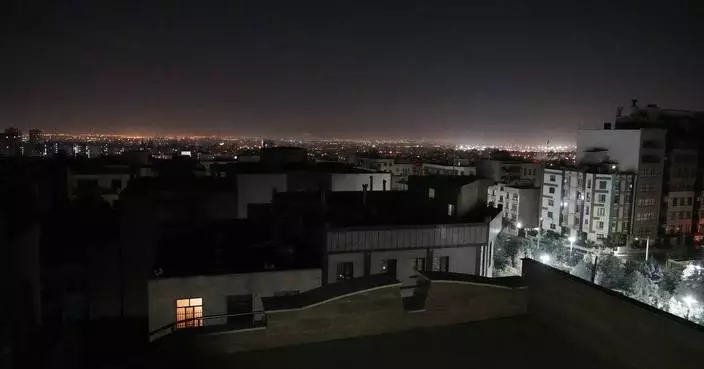SOELDEN, Austria (AP) — American ski star Mikaela Shiffrin led the women's World Cup season opener after the first run Saturday, with defending overall champion Lara Gut-Behrami deciding shortly before the start to skip the race.
Aiming for her record-extending 98th career win, Shiffrin wasn't flawless in the opening section of the giant slalom but beat her opponents with a strong middle part and finish.
Click to Gallery
Italy's Federica Brignone speeds down the course during an alpine ski, women's World Cup giant slalom, in Soelden, Austria, Saturday, Oct. 26, 2024. (AP Photo/Alessandro Trovati)
Italy's Federica Brignone speeds down the course during an alpine ski, women's World Cup giant slalom, in Soelden, Austria, Saturday, Oct. 26, 2024. (AP Photo/Marco Trovati)
New Zealand's Alice Robinson speeds down the course during an alpine ski, women's World Cup giant slalom, in Soelden, Austria, Saturday, Oct. 26, 2024. (AP Photo/Alessandro Trovati)
United States' Mikaela Shiffrin concentrates ahead of an alpine ski, women's World Cup giant slalom, in Soelden, Austria, Saturday, Oct. 26, 2024. (AP Photo/Gabriele Facciotti)
United States' Mikaela Shiffrin speeds down the course during an alpine ski, women's World Cup giant slalom, in Soelden, Austria, Saturday, Oct. 26, 2024. (AP Photo/Marco Trovati)
United States' Mikaela Shiffrin speeds down the course during an alpine ski, women's World Cup giant slalom, in Soelden, Austria, Saturday, Oct. 26, 2024. (AP Photo/Alessandro Trovati)
Alice Robinson of New Zealand led Shiffrin by 0.42 seconds at the second split but ultimately came up 0.22 short. Federica Brignone of Italy trailed by 0.40 in third, with only two more racers finishing within a second of the American's time.
“I felt good. My preparation going to this race was quite strong, I am happy with my skiing right now. The only task is to bring more intensity or more aggression, try to find time somewhere,” said Shiffrin, who was hugged by her fiancé, injured Norwegian skier Aleksander Aamodt Kilde, in the finish area.
“I had a moment where I didn’t really trust my direction where I was going," Shiffrin said. "It wasn’t a big mistake, it takes away your intensity a little bit. But then, after that, I was pushing even harder. Maybe it just took me until the pitch to turn on the gas. But even then it was really strong.”
Holding the women's record with 22 wins in the discipline, Shiffrin was racing her first GS since injuring her knee in a downhill crash in January. She is leaving the downhill off her schedule this season.
Gut-Behrami didn't start as she did “not feel 100%.”
The Swiss star, who suffered from knee problems and missed a week of training recently because of the flu, made the decision after course inspection shortly before the race.
“During the inspection, doing the warmup, I understood it was not the day to race. You can not go to the start and feel 90% or have doubts about your health,” Gut-Behrami said. “I don’t want to be injured to stop my career. I just want to be able to understand when it’s over and I don’t think it’s today.”
Gut-Behrami became the oldest winner of the women's World Cup overall title at 32 last season, overtaking five-time champion Shiffrin on top of the standings in the second half of the season, when the American was out nursing a knee injury. She also won the giant slalom season title.
Gut-Behrami, the Olympic super-G champion and 2021 world champion in GS, previously won the overall title in 2016 and has 45 race wins on the World Cup, including three at the traditional season-opening GS in Soelden.
Shiffrin led a strong performance by the U.S. ski team, with Paula Moltzan looming in seventh, and Katie Hensien in 17th and Nina O'Brien in 21st both qualifying for the second run in what is their comeback race after missing last season with injuries.
“A little bit relieved, for sure. I feel not totally satisfied, just because there is some mistakes,” O'Brien said. “But I’m glad I kept it rolling and I think all things considered I can feel OK about getting the first run out of the way.”
Eric Willemsen on X: https://x.com/eWilmedia
AP skiing: https://apnews.com/hub/alpine-skiing
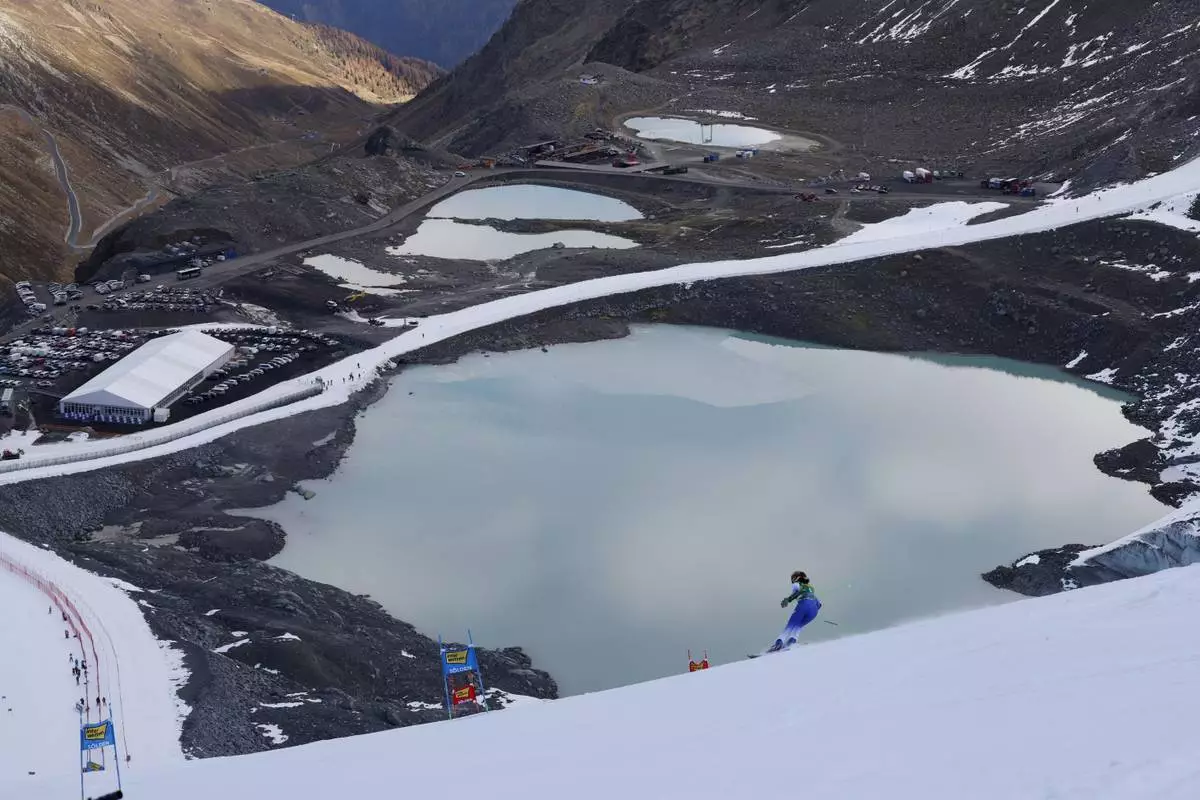
Italy's Federica Brignone speeds down the course during an alpine ski, women's World Cup giant slalom, in Soelden, Austria, Saturday, Oct. 26, 2024. (AP Photo/Alessandro Trovati)
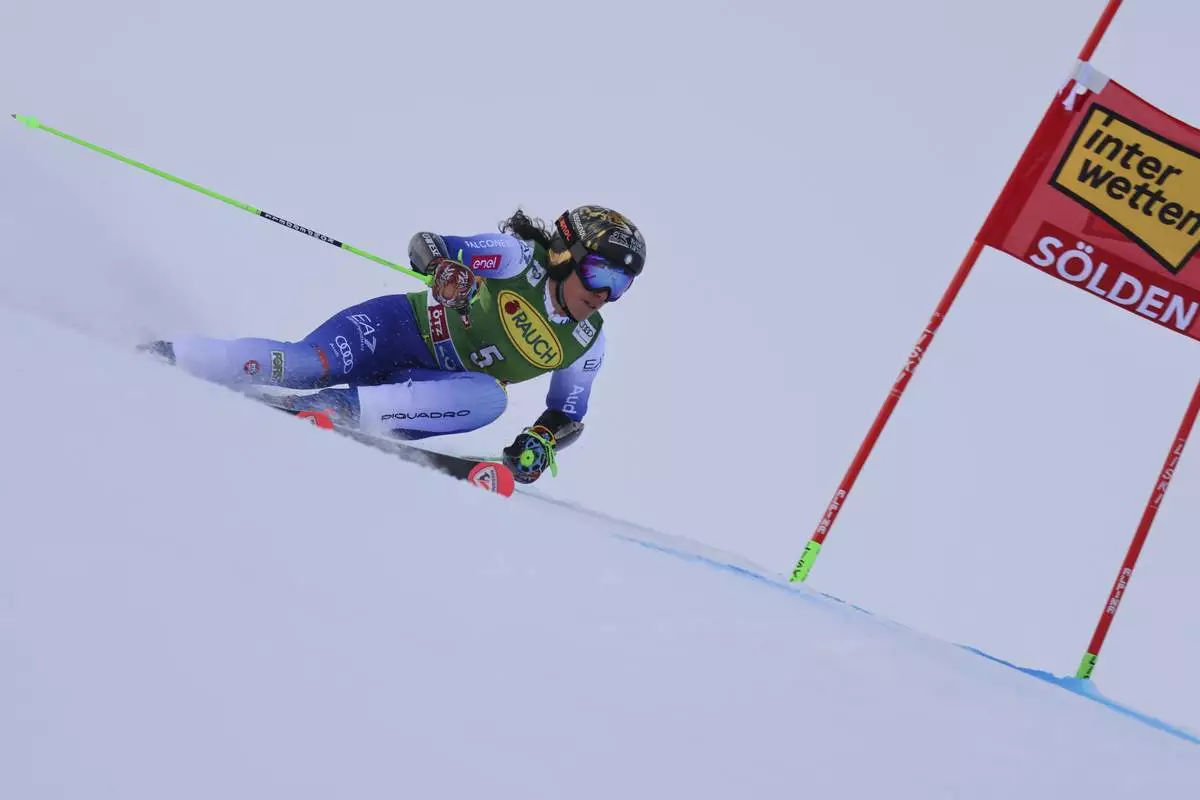
Italy's Federica Brignone speeds down the course during an alpine ski, women's World Cup giant slalom, in Soelden, Austria, Saturday, Oct. 26, 2024. (AP Photo/Marco Trovati)
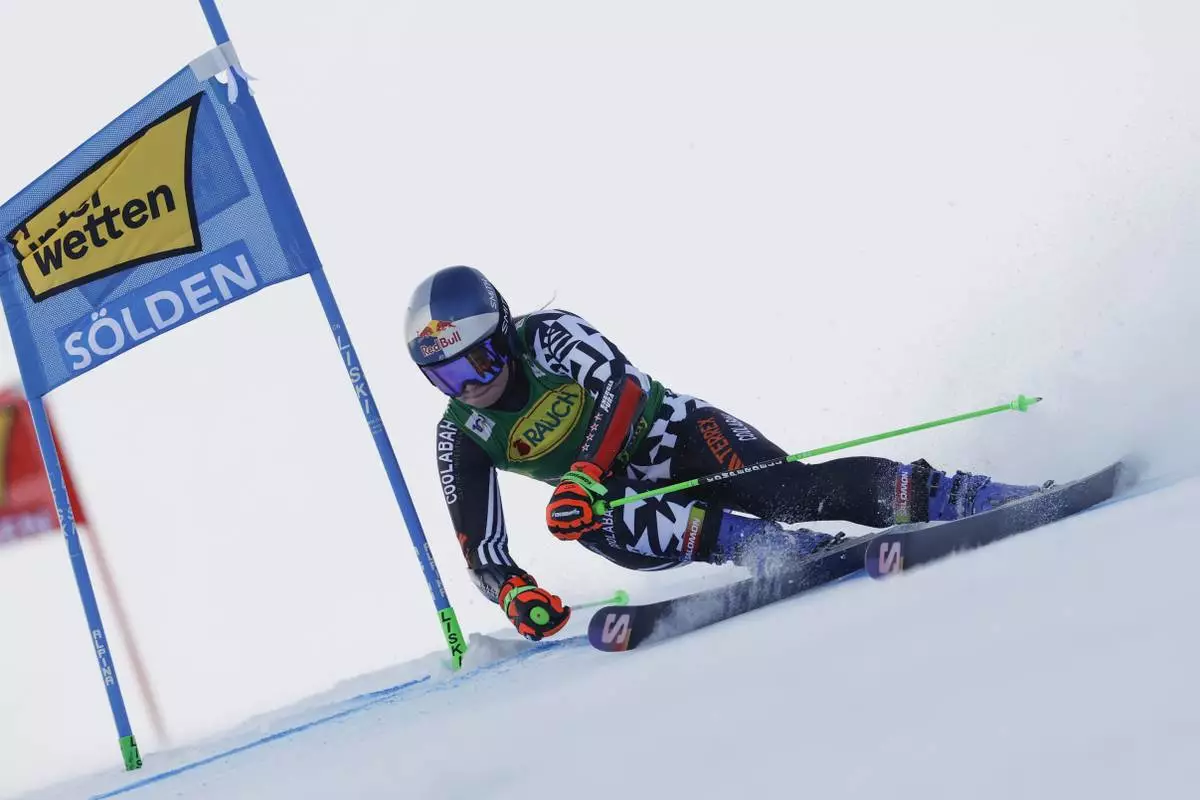
New Zealand's Alice Robinson speeds down the course during an alpine ski, women's World Cup giant slalom, in Soelden, Austria, Saturday, Oct. 26, 2024. (AP Photo/Alessandro Trovati)

United States' Mikaela Shiffrin concentrates ahead of an alpine ski, women's World Cup giant slalom, in Soelden, Austria, Saturday, Oct. 26, 2024. (AP Photo/Gabriele Facciotti)
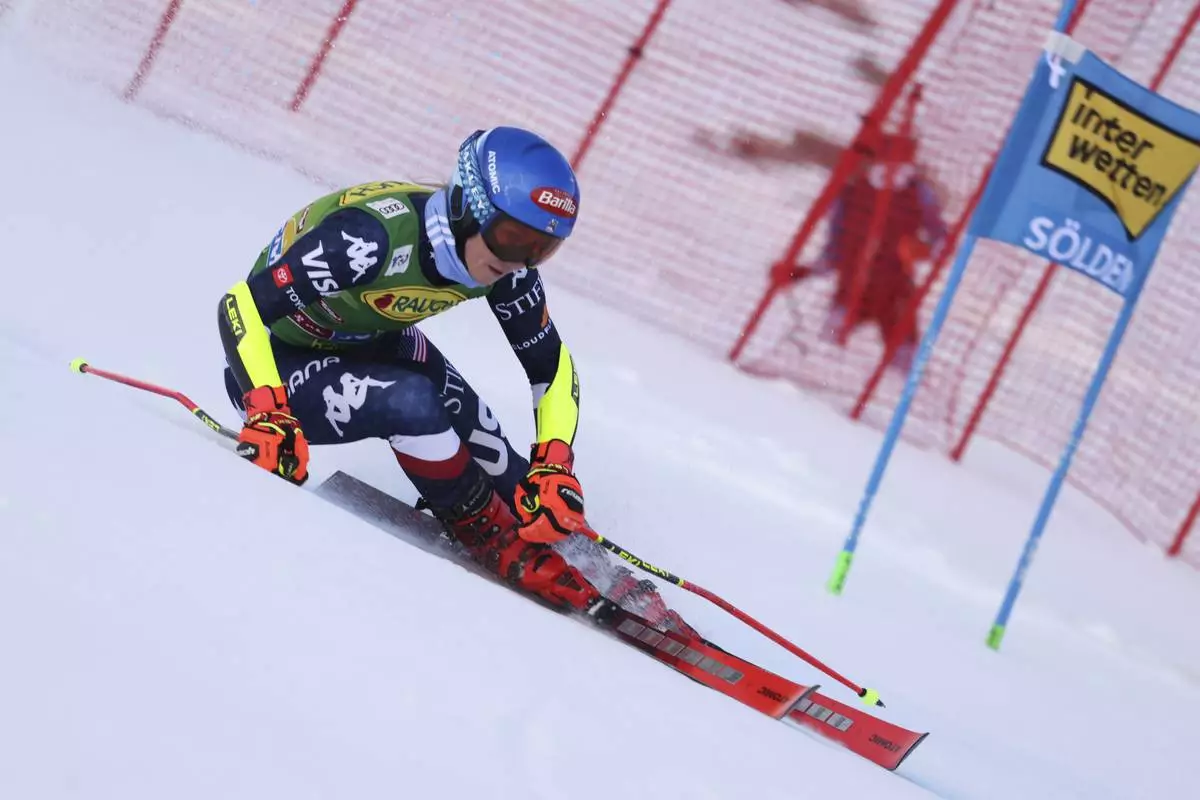
United States' Mikaela Shiffrin speeds down the course during an alpine ski, women's World Cup giant slalom, in Soelden, Austria, Saturday, Oct. 26, 2024. (AP Photo/Marco Trovati)

United States' Mikaela Shiffrin speeds down the course during an alpine ski, women's World Cup giant slalom, in Soelden, Austria, Saturday, Oct. 26, 2024. (AP Photo/Alessandro Trovati)
TEL AVIV, Israel (AP) — Israel attacked military targets in Iran with a series of pre-dawn airstrikes Saturday in retaliation for the barrage of ballistic missiles the Islamic Republic fired upon Israel earlier in the month.
The Israeli military said its aircraft targeted facilities that Iran used to make the missiles fired at Israel as well as surface-to-air missile sites. There was no immediate indication that oil or missile sites were hit — strikes that would have marked a much more serious escalation — and Israel offered no immediate damage assessment.
Explosions could be heard in the Iranian capital, Tehran, though the Islamic Republic insisted they caused only “limited damage” and Iranian state-run media downplayed the attacks. Iran's army said two of its troops had been killed in the attack, Iran's Al-Alam television reported.
Still, the strikes risk pushing the archenemies closer to all-out war at a time of spiraling violence across the Middle East, where militant groups backed by Iran — including Hamas in Gaza and Hezbollah in Lebanon — are already at war with Israel.
Following the airstrikes, Iran's Foreign Ministry issued a statement saying it had a right to self-defense, and "considers itself entitled and obligated to defend against foreign acta of aggression."
“Iran attacked Israel twice, including in locations that endangered civilians, and has paid the price for it,” said Israeli military spokesperson Rear Adm. Daniel Hagari.
“We are focused on our war objectives in the Gaza Strip and Lebanon. It is Iran that continues to push for a wider regional escalation.”
Photos and video released by Israel showed Prime Minister Benjamin Netanyahu, wearing a black casual jacket, and Defense Minister Yoav Gallant meeting with military advisers and others in a conference room at a military command and control center in the Kirya military base in Tel Aviv.
The strikes filled the air for hours until sunrise in Iran. They marked the first time Israel's military has openly attacked Iran, which hasn't faced a sustained barrage of fire from a foreign enemy since its 1980s war with Iraq.
Israel is also widely thought to have been behind a limited airstrike in April near a major air base in Iran in which the radar system for a Russian-made air defense battery was hit.
Saturday's attack came as part of Israel's “duty to respond” to attacks on it from “Iran and its proxies in the region,” Hagari said.
“The Israel Defense Forces has fulfilled its mission,” Hagari said. “If the regime in Iran were to make the mistake of beginning a new round of escalation, we will be obligated to respond.”
Israel’s attack effectively sent the message to Iran that it would not remain silent, while not taking out highly visible or symbolic facilities that could prompt an significant response from Iran, said Yoel Guzansky, a researcher at Tel Aviv's Institute for National Security Studies who formerly worked for Israel’s National Security Council.
At the same time, it also gives Israel room for further escalation if needed, and the targeting of air defense systems weakens Iran’s capabilities to defend against future attacks, he said, adding that if there is Iranian retaliation, he expects it to be limited.
“There’s more chances of Iranian restraint because of their interests, because of pressure from the outside, and because of the nature of the Israeli attack … that allows them to save face,” he said.
Israel’s opposition leader, Yair Lapid, criticized the decision to avoid “strategic and economic targets" in the attack.
"We could and should have exacted a much heavier price from Iran,” Lapid wrote on X.
The United States warned against further retaliation, indicating that the overnight strikes should end the direct exchange of fire between Israel and Iran, and British Prime Minister Keir Starmer said “Iran should not respond.”
“We need to avoid further regional escalation and urge all sides to show restraint,” he said while attending a summit in Samoa.
Saudi Arabia was one of multiple countries in the region condemning the strike, calling it a violation of Iran's "sovereignty and a violation of international laws and norms.”
The kingdom’s foreign ministry said it rejected the escalation in the region and “the expansion of the conflict that threatens the security and stability of the countries and people of the region.”
Iran-backed Hamas called the attack “an escalation targeting the region's security and its people's safety.”
Nuclear facilities and oil installations were all seen as possible targets for Israel’s response to Iran’s Oct. 1 attack, before U.S. President Joe Biden's administration won assurances from Israel in mid-October that it would not hit such targets, which would be a more severe escalation.
Iran’s military said the strikes targeted military bases in Ilam, Khuzestan and Tehran provinces, without elaborating.
It closed its airspace during the attack but Iran's Civil Aviation Organization said flights were resuming at 9 a.m., Iranian state news agency IRNA reported.
Iran’s state-run media acknowledged blasts that could be heard in Tehran and said some of the sounds came from air defense systems around the city. But beyond a brief reference, Iranian state television for hours offered no other details.
Iran's move to quickly downplay the attack may offer an avenue for it not to respond, averting further escalation.
Iran fired a wave of missiles and drones at Israel in April after two Iranian generals were killed in an apparent Israeli airstrike in Syria on an Iranian diplomatic post. The missiles and drones caused minimal damage, and Israel — under pressure from Western countries to show restraint — responded with a limited strike it didn't openly claim.
In Lebanon, dozens were killed and thousands wounded in September when pagers and walkie-talkies used by Hezbollah exploded in two days of attacks attributed to Israel. A massive Israel airstrike the following week outside Beirut killed Hezbollah’s longtime leader, Hassan Nasrallah, and several of his top commanders.
On Oct. 1, Iran launched at least 180 missiles into Israel in retaliation, sending Israelis scrambling into bomb shelters but causing only minimal damage and a few injuries.
Netanyahu immediately said Iran had “made a big mistake.”
Israel then ratcheted up the pressure on Hezbollah by launching a ground invasion into southern Lebanon. More than a million Lebanese people have been displaced, and the death toll has risen sharply as airstrikes hit in and around Beirut.
Israel and Iran have been bitter foes since the 1979 Islamic Revolution. Israel considers Iran to be its greatest threat, citing its leaders’ calls for Israel’s destruction, their support for anti-Israel militant groups and the country’s nuclear program.
During their yearslong shadow war, a suspected Israeli assassination campaign has killed top Iranian nuclear scientists and Iranian nuclear installations have been hacked or sabotaged, all in mysterious attacks blamed on Israel.
Meanwhile, Iran has been blamed for a series of attacks on shipping in the Middle East in recent years, which later grew into the attacks by Yemen’s Houthi rebels on shipping through the Red Sea corridor.
The shadow war has increasingly moved into the light since Oct. 7, 2023, when Hamas and other militants attacked Israel. They killed 1,200 people, mostly civilians, and took some 250 hostages into Gaza. In response, Israel launched a devastating air and ground offensive against Hamas, and Netanyahu has vowed to keep fighting until all of the hostages are freed. Some 100 remain, of whom roughly a third are believed to be dead.
More than 42,000 Palestinians have been killed in Gaza, according to local health officials, who don’t differentiate between civilians and combatants but say more than half of the dead have been women and children.
Gambrell reported from Dubai, and Schreck from Jerusalem. United Arab Emirates. Associated Press writers Amir Vahdat in Tehran, Iran; Abby Sewell in Beirut; Lolita C. Baldor, Farnoush Amiri and Zeke Miller in Washington; David Rising in Bangkok; and Aamer Madhani in Wilmington, Delaware, contributed to this report.
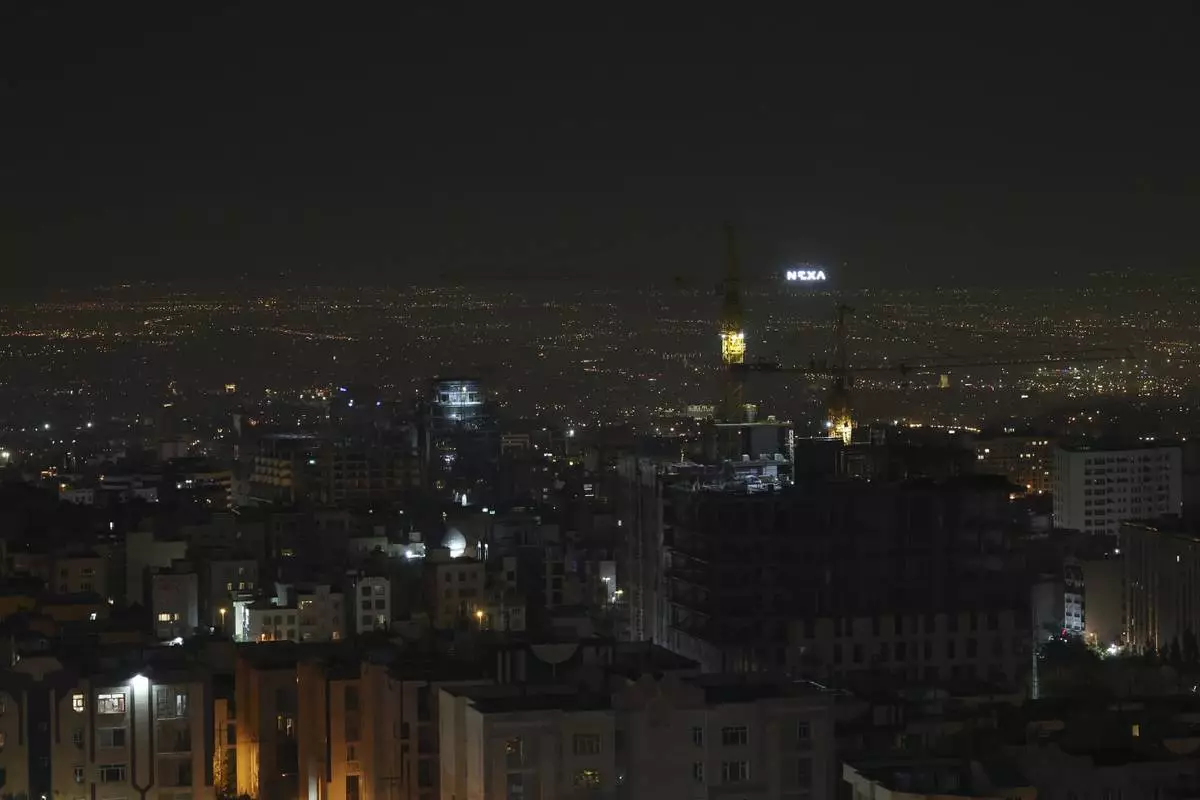
A view of Tehran capital of Iran is seen, early Saturday, Oct. 26, 2024. (AP Photo/Vahid Salemi)
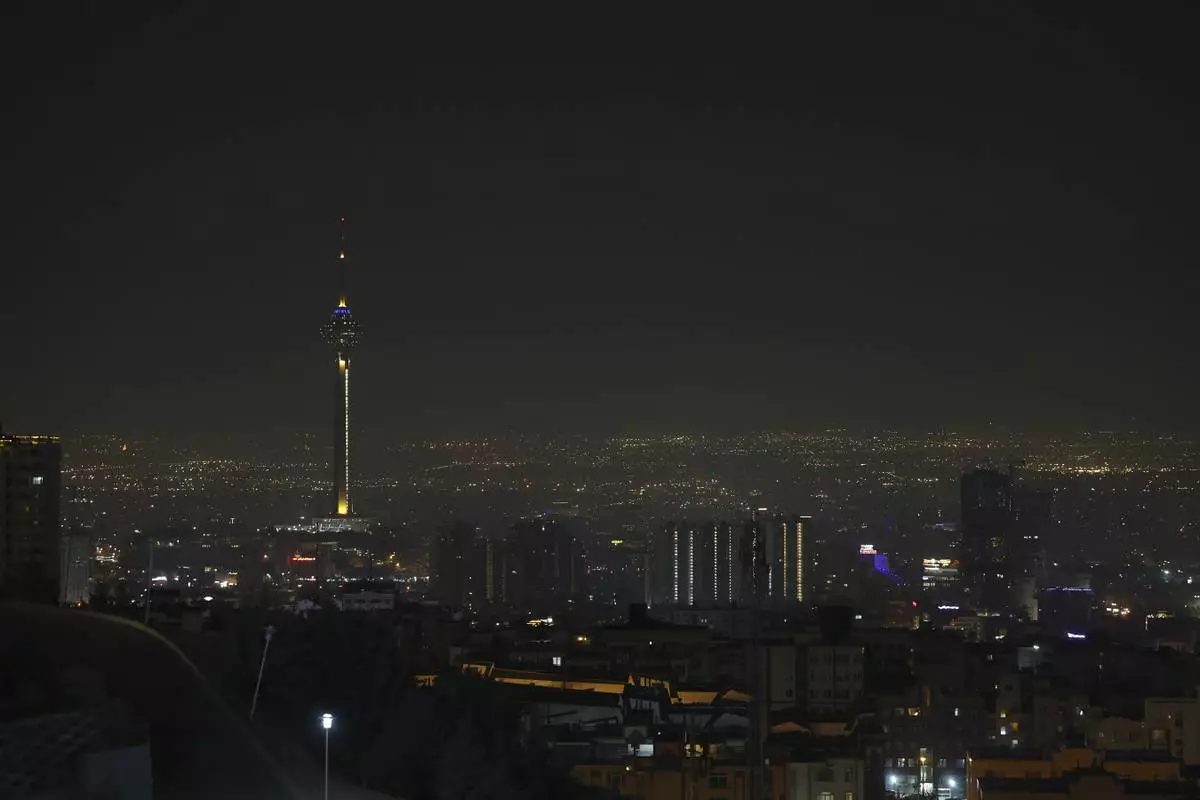
A view of Tehran capital of Iran is seen, early Saturday, Oct. 26, 2024. (AP Photo/Vahid Salemi)
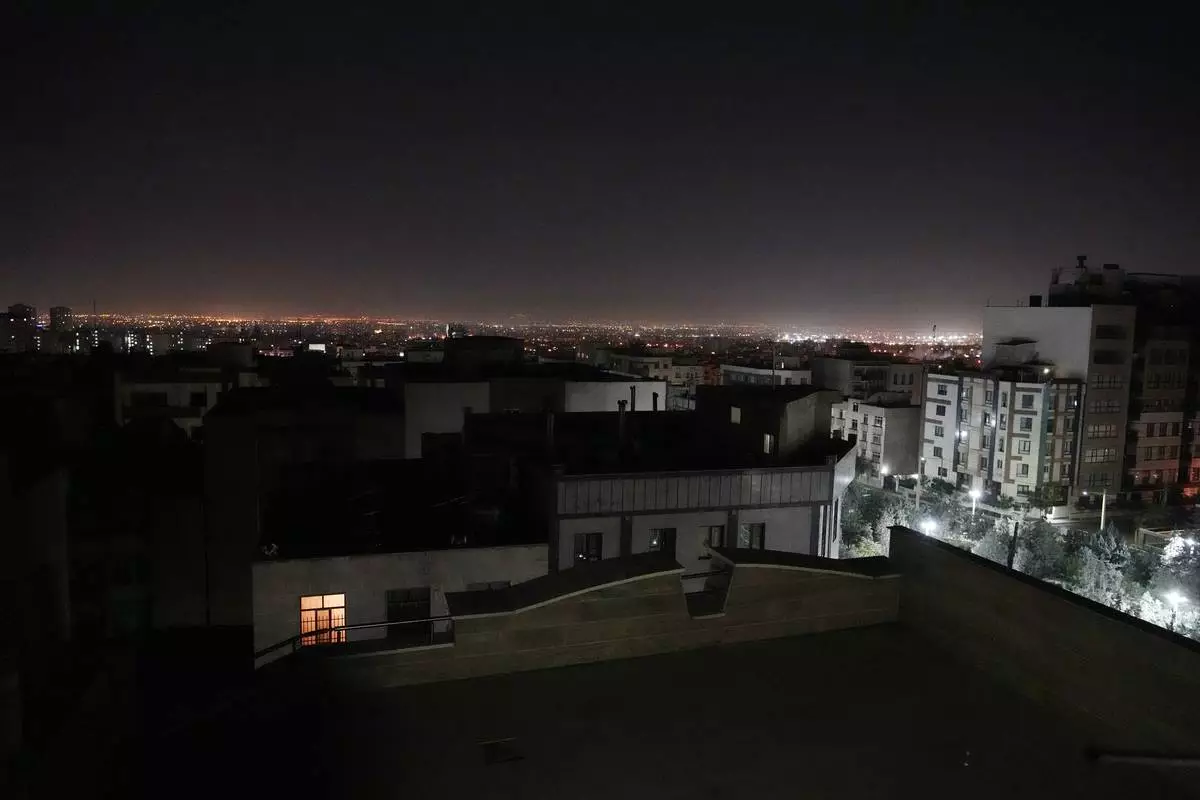
A view of Tehran capital of Iran is seen, early Saturday, Oct. 26, 2024. (AP Photo/Vahid Salemi)
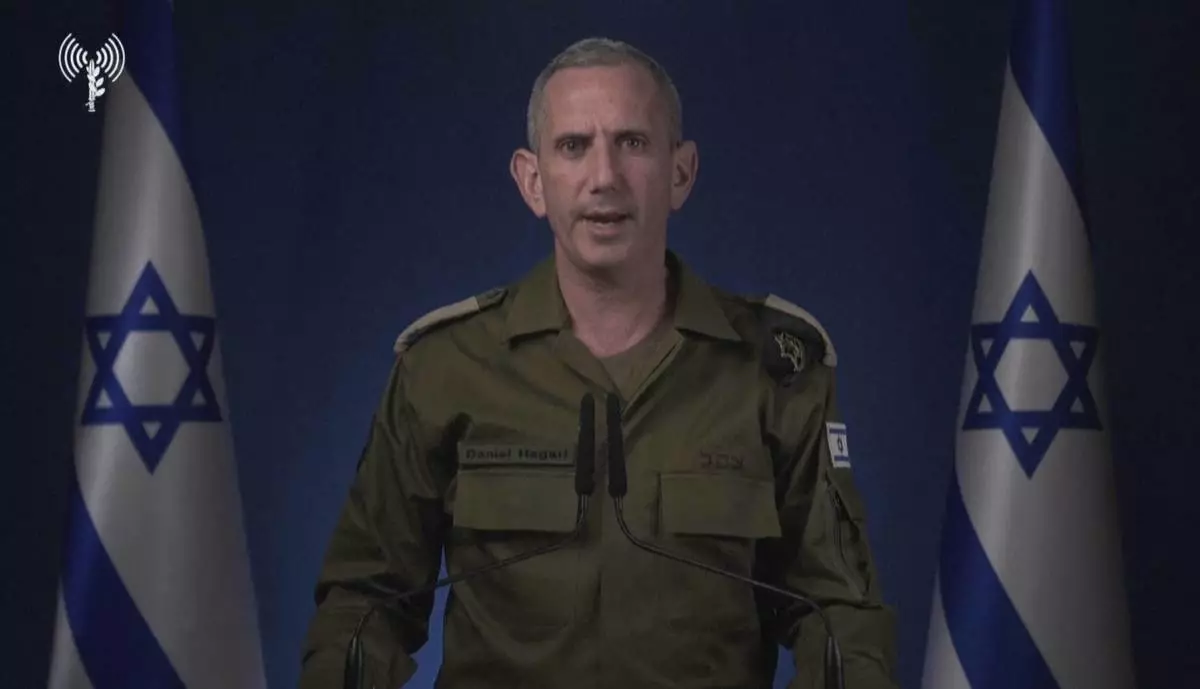
In this image taken from video released by the Israel Defense Forces early Saturday, Oct. 26, 2024, Israeli military spokesperson Rear Adm. Daniel Hagari announces that the IDF is conducting strikes on military targets in Iran. (Israel Defense Forces via AP)
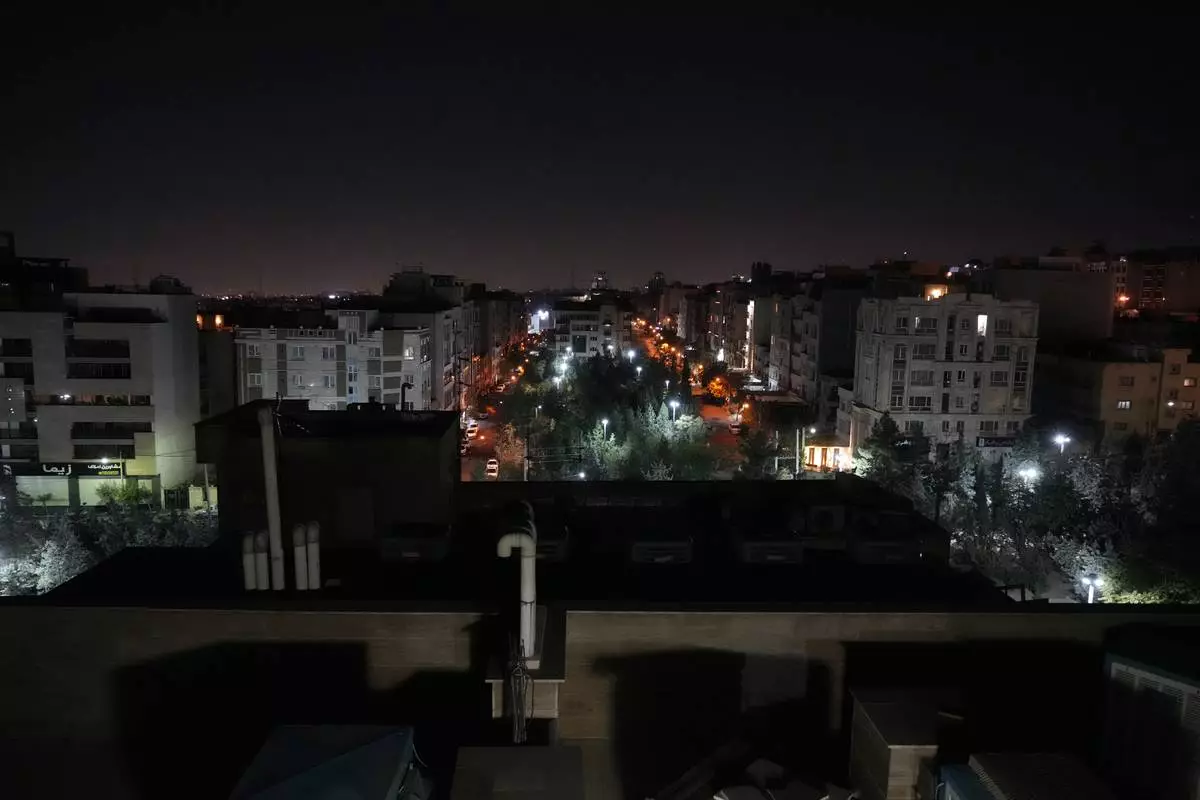
A view of Tehran capital of Iran is seen, early Saturday, Oct. 26, 2024. (AP Photo/Vahid Salemi)




















